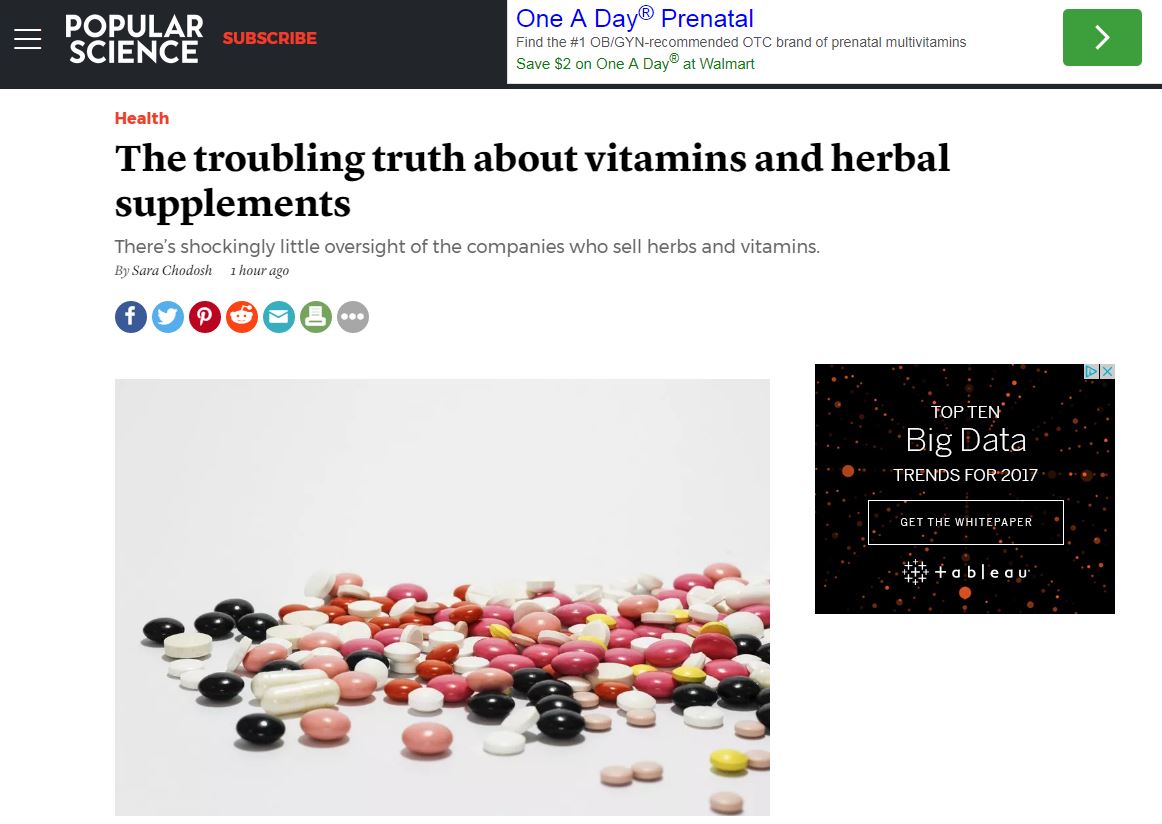This is a duplicate post to one on my main blog: https://compliancearchitects.com/blog/
Two months ago I posted in LinkedIn about a Popular Science article that unfairly characterized FDA’s regulatory process, and implied FDA tacitly agreed with a company’s characterization of what can best be considered a sham product as a medical device. See, https://www.linkedin.com/feed/update/urn:li:activity:6277978180909305856
Now, Popular Science has, in an article today, misrepresented the science, safety and adverse event experience of the dietary supplement industry, and confused dietary supplements with homeopathic remedies, creating confusion and doubt for their readers, while mis-characterizing the actual problem: homeopathic drugs.
According to the Federal Food Drug and Cosmetic Act, any article recognized in the Homoeopathic Pharmacopoeia of the United States is expressly recognized as a drug. See 21 USC 321(g)(1)(A). By contrast, dietary supplements are designated as a separate class of legal products, with completely different defining characteristics in the law. See 21 USC 321(ff). While the marketing and distribution of both homeopathic drugs and dietary supplements are legal in the US pursuant to the FFDCA, they are separately regulated products, with differences in allowable claims, manufacturing requirements, and other regulatory expectations. Note: FTC also has jurisdiction over both product classes for marketing/advertising substantiation requirements.
Since the formal establishment of the term “dietary supplement” within the FFDCA pursuant to the Dietary Supplement Health and Education Act of 1994, FDA and the dietary supplement industry have jointly participated in a transition from a loosely-defined set of FDA expectations, to a risk-appropriate set of regulatory requirements that seems to be working reasonably well for a set of products that the public wants, and that pose little apparent risk to the consuming public.
Homeopathic drugs on the other hand are much different. First, it appears from a review of the OTC aisles in a local pharmacy that there are many products that are masquerading as homeopathic drugs when in fact, they may be dietary supplements or just products using the homeopathic “allowance” to get to market without a pre-market authorization. This is problematic, since as a drug, under the law, a company may make claims that the product can “prevent, treat, cure or mitigate” a disease state – whatever that may be. The effect of which is that these homeopathic “drugs” are making disease-state claims – often without any underlying shred of scientific evidence that they work.
So let’s get back to Popular Science. The author of the article has completely confused dietary supplements with homeopathic remedies. She cites the lack of pre-market approval requirements for dietary supplements as proof that “that a huge fraction of botanical supplements either contain an entirely different active ingredient from what they claim or contain a filler like rice powder.” Anyone who understands the industry knows that a pre-market approval requirement has NO relation to the requirement for a dietary supplement (or pharmaceutical) to contain what it label claims it does – otherwise it is adulterated under the FFDCA. She asserts that “from 2005 to 2012, the rate of reported dietary supplement exposures increased 49.3 percent.” She then, recognizing some difference, asserts that “[h]omeopathic cures and ma huang-containing pills were responsible for most of that….” Her confusion of the regulated product classes, and inability to separate pre-approval issues, manufacturing issues, and post-market surveillance issues creates confusion for the reader by intimating that homeopathic cures are dietary supplements, and that dietary supplement products are unregulated, dangerous, and not subject to oversight by the FDA.
While there is a great deal that could be written on this topic, the main thrust is this: Popular Science is not adhering to even basic editorial standards relative to articles concerning FDA regulation. They are wrong about FDA regulation, wrong about causal factors, and are doing a disservice to their readers. I have loved reading Popular Science over the years, but if this is the level of journalistic and editorial rigor applied to their articles, what else am I reading there that is inaccurate / just plain wrong.
Be careful with homeopathic remedies. Be careful with Popular Science.

